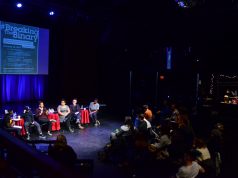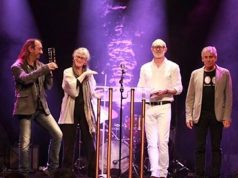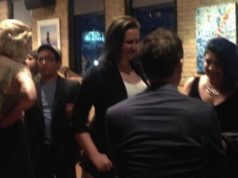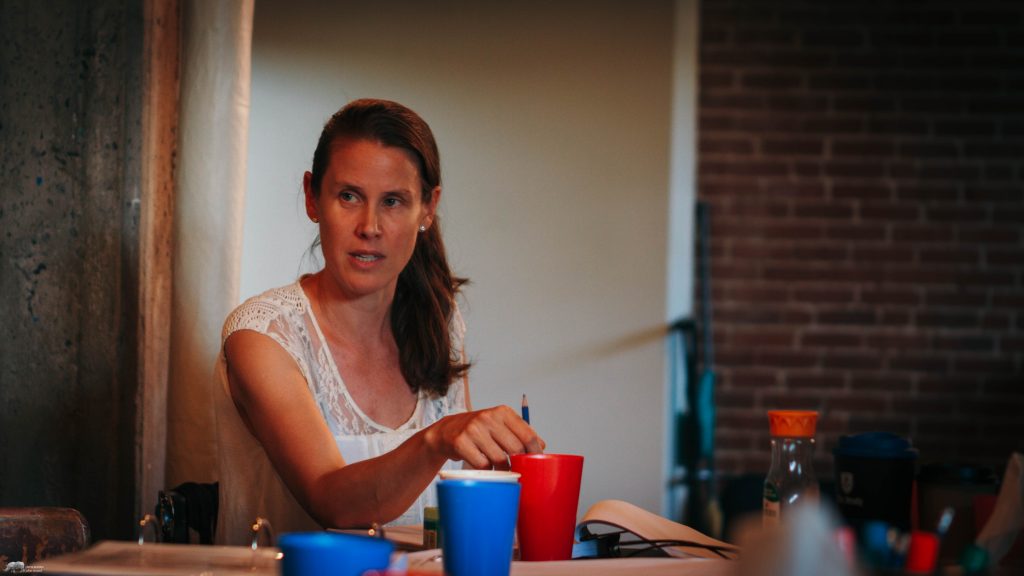
Unless your house has been gutted by a flood, your ski business crippled by balmy temperatures into late December, or your power killed for months in the dead of winter by an ice storm, how likely are you to engage with the imminent threat of climate change and consider how your everyday actions may be contributing to environmental crisis?
In her latest documentary play for Crow’s Theatre, The Watershed, Annabel Soutar invites us to do so by reflecting back to us the daily life of her own well-meaning, deeply recognizable family. While acknowledging the extreme pressures to which the modern family is subjected in a capitalist society, Annabel highlights her family’s complicity in our fossil-fuel based economy, and the hypocrisy people of all generations inevitably encounter when the unsustainable pace of their lives constrains them to make choices that are unsustainable for the environment.
Annabel exposes her family and herself as a means to inspire us to examine our own actions more closely, employing to great effect the humour and pathos of the theatrical medium to render the daily permutations of what is often an abstract concept – “climate change” – very immediate for the audience.
A byproduct of inserting herself as the central character in The Watershed is that Annabel is totally transparent with her artistic process. The documentary theatre maker’s quest to create a balanced portrait of the polarization of environment and economy constitutes the action of the play. How she undertakes to address climate change through her practice becomes the structural exoskeleton of the play we end up watching.
We learn that Annabel’s modus operandi is to represent a multiplicity of divergent perspectives on her subject. In a Skype call with fresh-water scientist cum activist Diane Orihel, Annabel explains:
“I go out with a tape recorder and I start interviewing people and I actually use that material verbatim on the stage… I don’t seek to represent any one voice or message about the conflict. I try and present a kind of 360-degree portrait, which is never perfectly neutral or objective but I tend to listen to all sides of the story and the drama is created through the competing voices that are trying to influence my version of what I perceive to be the truth.”
However, as Annabel’s inquiry into water transmutes into an exposé of the deadlock we’ve reached between economic growth and environmental stewardship, it becomes clear that representing a range of viewpoints on this subject is going to be difficult, if not impossible.
Both Annabel the writer and Annabel the character grapple with the devastating realization that whereas not all that long ago environmentalism was a bipartisan value, it has now become a divisive, even dirty word, in some circles. In an email to The Watershed collaborator and director, Chris Abraham, upon her return from a road trip to the oil sands, Annabel concludes:
“…what it takes for society to confront environmental collapse [is] we have to be capable of communicating with each other. Our future depends on it, and today we are woefully incapable of abandoning self-interest to work together as a group. […] In this environment, communication is no longer defined as a process of creating understanding between people, it is a power game people learn to control for their own benefit.”
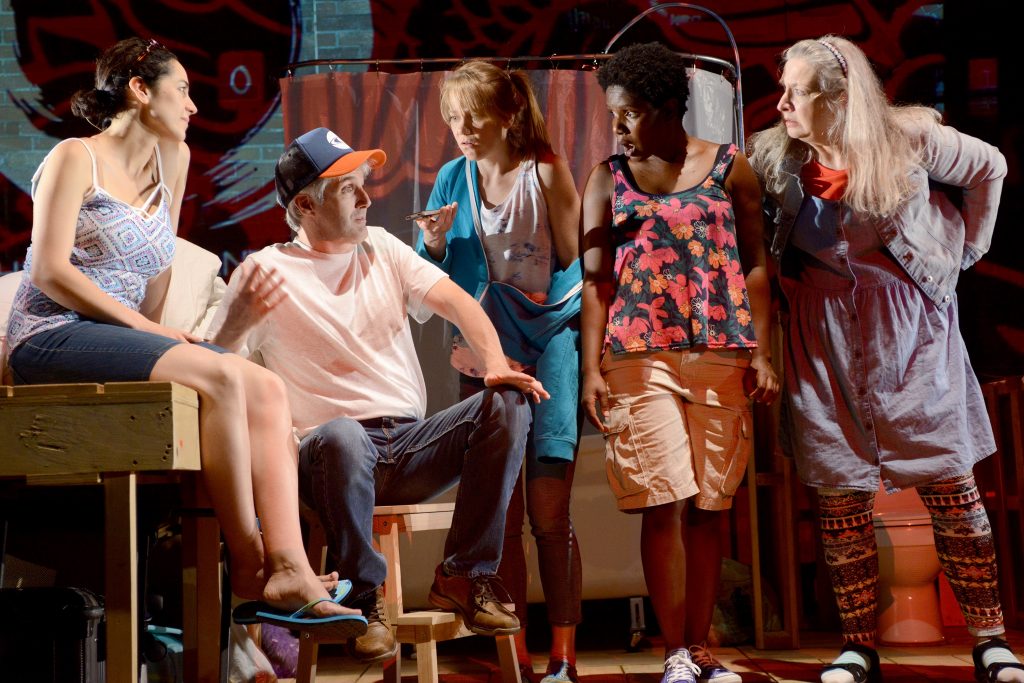
The position of economically-motivated Conservatives remains more elusive to Annabel, who finds herself often having to rely on statements by public figures (like Joe Oliver, Stephen Harper, and Greg Rickford), rather than having access to one-on-one interviews, to shed light on the thinking behind what appears to be an anti-science, anti-environment, pro-oil agenda.
Ultimately, The Watershed succeeds in giving us the balanced view Annabel values by empathetically representing the perspectives of characters, like the oil sands worker interviewed at a sushi restaurant in Fort McMurray, the oil sands executive who alludes to his industry’s strained efforts to work with scientists, and most significantly, her father, an avowed Conservative, a celebrated patron of environmental causes, and perhaps the person whom Annabel respects most in the world.
Having actors embody and empathize with the multiple perspectives she has gathered on the topic is a very deliberate way in which Annabel copes with climate change in her practice. As she puts it, “when we go to the theatre and see an actor assume multiple roles and defend multiple, sometimes opposing, points of view, we’re witnessing an individual stand up for other individuals and accept to see the world from different perspectives.”
What actors are called to do here (as in any other play) is inhabit and render thoughts and motivations which may be foreign and even objectionable to them personally with enough detail, conviction, and dignity that someone in the audience encountering these thoughts and motivations may be able to comprehend them. The added challenge in The Watershed is that many characters are public figures about whom audiences may already have very strong opinions. So our responsibility as storytellers is to represent their perspectives with ever more humanity, depth, and delicacy.
The effort to do so is proof of our capacity to overcome the essential problem around climate change diagnosed in the making of The Watershed. It is proof of our ability to see the world from different perspectives, to try to understand rather than deepen ideological fissures, to triumph over the breakdown in communication that has defined our socio-political landscape of late.
In a world where news feeds are increasingly self-curated, and the wormhole of the internet enables us to pursue ideas and opinions that reinforce and never challenge our beliefs, the theatre remains a forum to expose people to a variety of in-depth perspectives. People who align with Annabel’s father’s thinking will find ideas and rhetoric within the play to support their position, just as people who are more in line with Maude Barlow’s bent will also find their worldview reflected. But each will hear the other’s perspective, and it will be unpacked with significantly more detail than a pre-digested sound bite.
The communal nature of theatre also creates the opening to reach out to the sentient being sitting next to you for the last three hours to ask why he or she scoffed at the thing that tugged most at your heart strings. This is not possible when we watch things alone in front of our screens. We’ve just seen Annabel and her father do it – reach out to each other across an ideological chasm – because turning a blind eye until we are struck with flood or drought or apocalyptic downpour isn’t cutting it anymore. Ultimately, that is the legacy of the play, and the three generations at the heart of the play: while there may never be an easy answer, it is our duty, as stewards of all that we have been given, to at least entertain the opposing view and engage in the conversation.






